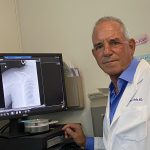“I’m very excited someone who has obviously come up with an idea that definitely is well worth supporting is the first recipient [of the award],” Dr. Gaylis said. “It’s a subject that crosses genetics and ethnic lines. Gout is extremely common and poorly treated in the whole of the U.S., if not the world. More information as to genetic causes will help us develop a better understanding of this condition, and eventually, this could point to potential pathways for improved treatments for patients.”
The Award
This award was established by the Foundation with a generous donation from Dr. Gaylis as a way to encourage practicing clinicians to research their ideas for new and improved treatment for rheumatic disease. “I thought we needed an award unique to clinical practice … [because] I wanted to give something back to my colleagues who are in the same environment I’ve spent my life working in,” Dr. Gaylis said.
Dr. Gaylis was inspired by his own career as a practicing physician and clinical researcher. He wanted to encourage more clinicians to engage in research and explore their ideas, because the majority of rheumatology patients are treated in private practices as opposed to research institutions. In an effort to improve care in his own practice, Dr. Gaylis has developed research protocols to help patients who present with different symptoms.
“I’ve seen and realized that, in clinical practice, there’s a wealth of opportunities for clinical practitioners to do these kinds of studies, but the obstacle for that occurring is the lack of time, support, know-how and economics,” Dr. Gaylis said. That’s where the Gaylis Award comes into play—by supporting clinicians who want to test their own observations through research for the betterment of rheumatology patients and potentially affect rheumatology practice more broadly.
“I wanted to give something back to my colleagues who are in the same environment I’ve spent my life working in,” Dr. Gaylis said. “A clinical rheumatologist is what I am and who I am and where I’ve been successful over the years, so why not create an award that promotes that?
“I’m personally very excited,” he said. “It’s very gratifying to me to be able to make this happen. I just hope we can continue to see this opportunity grow. That’s a key part of this [effort] to increase the visibility of the opportunity. … I look forward to the results of this study—and future studies that receive support—to see if it becomes something very important in the world of rheumatology. That would be the ultimate.”



